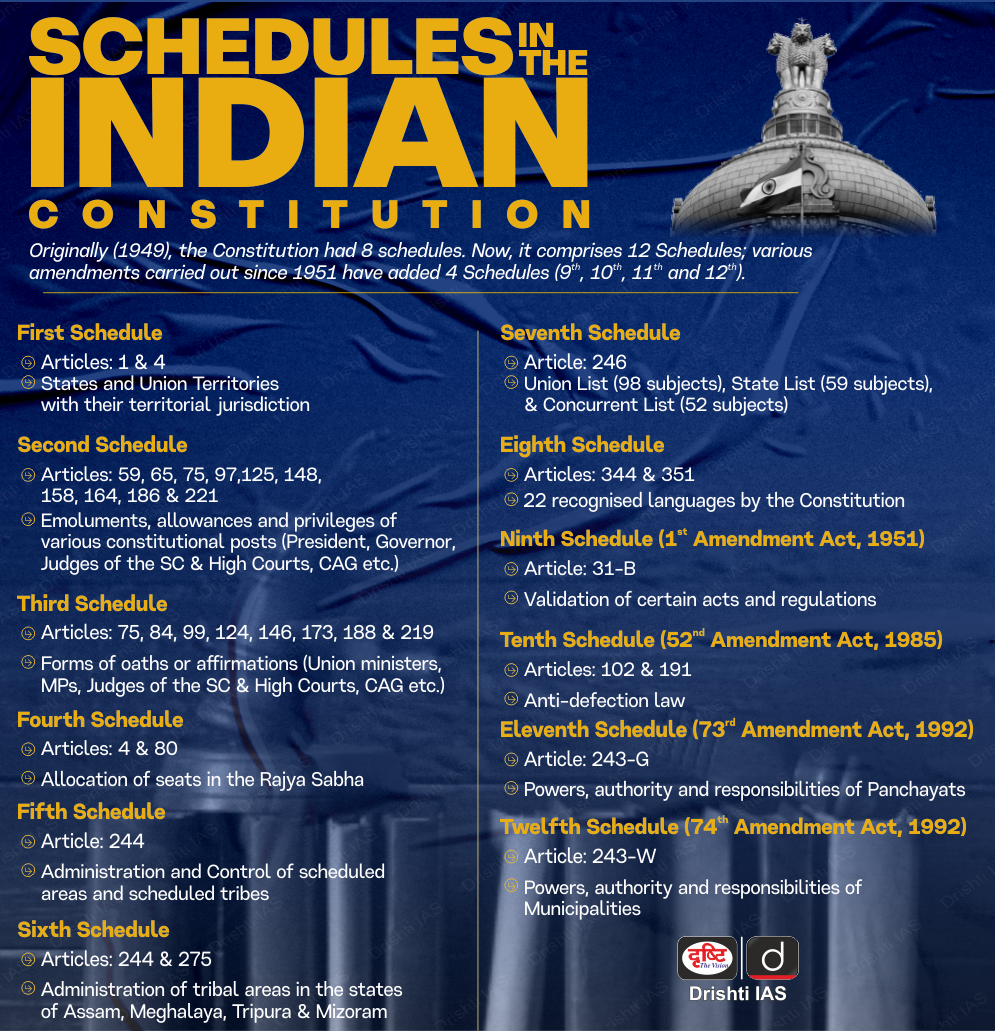Important Facts For Prelims
ADCs Raise Demand to Pass 125th Constitutional Amendment Bill
- 27 Jul 2024
- 6 min read
Why in News?
Recently, the Chief Executive Magistrates (CEMs) of 10 Autonomous District Councils (ADCs) from northeastern states of Assam, Meghalaya and Mizoram and Tripura met the Union Home Minister, putting forward the demand of passing of the 125th Constitutional Amendment Bill.
- In this context, the Union government decided to form a committee headed by the Minister of State for Home Affairs to resolve the issues related to the Bill.
What are the Proposed Amendments in the 125th Constitutional Amendment Bill?
- The Bill aims to grant more financial, executive and administrative powers to tribal autonomous councils under the Sixth Schedule of the Constitution.
-
Village and Municipal Councils:
- The proposal includes the creation of Village and Municipal Councils alongside the existing District and Regional Councils.
- Village Councils will be set up for individual villages or clusters of villages in rural areas, while Municipal Councils will be established in urban areas within each district.
- District Councils will have the authority to enact laws regarding:
- The number and composition of Village and Municipal Councils.
- The delimitation of constituencies for elections to these councils.
- The powers and functions of the Village and Municipal Councils.
- Rules for Devolution of Powers: The Governor will have the authority to create rules for the devolution of powers and responsibilities to Village and Municipal Councils.
-
These rules may cover:
- The preparation of economic development plans.
- The implementation of land reforms.
- Urban and town planning.
- Regulation of land use, among other responsibilities.
- The Bill proposes that the Governor may also establish rules for the disqualification of council members based on defection.
-
- State Finance Commission: The Bill provides for the appointment of a Finance Commission in these states to assess the financial status of District, Village, and Municipal Councils. The Commission will make recommendations on:
- The distribution of taxes between states and District Councils.
- Grants-in-aid to District, Village, and Municipal Councils from the state’s Consolidated Fund.
- Elections to Councils: Elections for District Councils, Regional Councils, Village Councils, and Municipal Councils will be overseen by the State Election Commission, which is appointed by the Governor for these four states.
-
Current Status of the Bill:
- The Constitution (125th Amendment) Bill 2019, was introduced in the Rajya Sabha and was subsequently referred to the Departmental-Related Standing Committee on Home Affairs.
- The committee raised several concerns about the Bill in its 2020 report, and it has remained pending since then.
What is the Sixth Schedule of the Constitution?
- Scope: Provides for governance of tribal areas in Assam, Meghalaya, Tripura, and Mizoram to protect tribal rights.
- Constitutional Basis: Article 244 (2) (provisions of the Sixth Schedule shall apply to the administration of the tribal areas in the States of Assam Meghalaya, Tripura and Mizoram) and Article 275 (1) (it guarantees grants-in-aid from the Consolidated Fund of India).
- Autonomy: Provides for governance through Autonomous District Councils (ADCs), which can legislate on land, forest, cultivation, inheritance, customs, and taxes.
- Governance: ADCs function like miniature states with legislative, executive, and judicial powers.
What are Autonomous District Councils (ADCs)?
- About: ADCs are constitutional devices created under the Sixth Schedule of the Constitution (Article 244) in Northeast India. Their purpose is to protect cultural identities and preservation of natural resources of the tribal people.
- Governor’s Authority: Can organise, reorganise, and modify autonomous districts, including their areas and boundaries.
- Tribal Distribution: If multiple tribes are present, the governor can create autonomous regions within the district.
- Composition:
- District Council: Each district has a council of 30 members (4 nominated by the governor, 26 elected), serving a five-year term.
- Regional Council: Each autonomous region has its own council.
- Administration: District and regional councils manage their jurisdictions and may establish village councils or courts for tribal disputes. Appeals are heard as specified by the Governor.
- As of now, 10 autonomous councils exist - three each in Assam, Meghalaya, and Mizoram, and one in Tripura.
Read more: Indepth- 6th Schedule & ILP
UPSC Civil Services Examination, Previous Year Question (PYQ)
Prelims:
Q. Under which Schedule of the Constitution of India can the transfer of tribal land to private parties for mining be declared null and void? (2019)
(a) Third Schedule
(b) Fifth Schedule
(c) Ninth Schedule
(d) Twelfth Schedule
Ans: (b)





